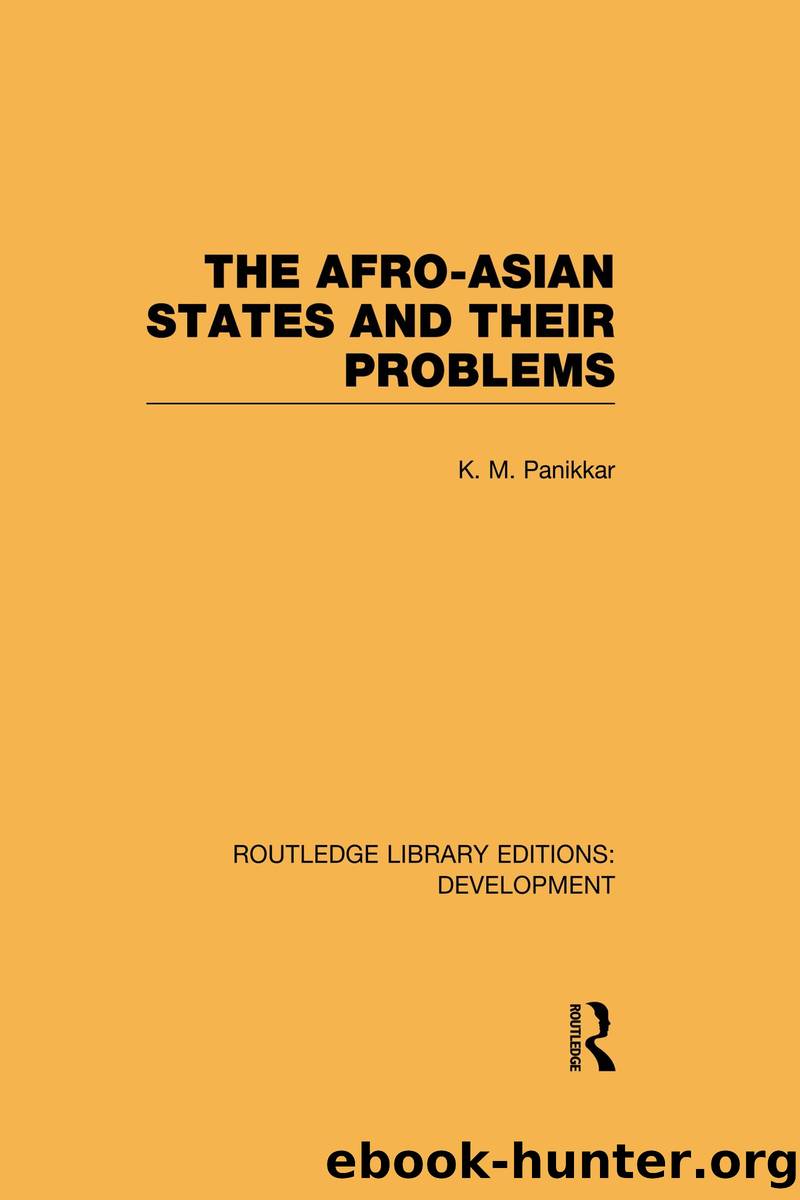The Afro-Asian States and Their Problems by Panikkar K. M.;

Author:Panikkar, K. M.; [Panikkar, K. M.]
Language: eng
Format: epub
Publisher: Taylor & Francis Group
Published: 2022-06-09T00:00:00+00:00
IV Education
DOI: 10.4324/9780203835746-5
one of the most important problems which faces the new States is that of education, both general and scientific. There are three special aspects of this question which arise out of the previous condition of dependence of these States. The first is that in everyone of these countries, excepting the Arab States, higher education is through foreign languages. Secondly, nowhere was there a system of national education reaching down to the people. Thirdly, education was mainly of a literary character.
It was in India that a large-scale educational system through a foreign European language was first organised and carried on for over a century. The system had some notable advantages in a country which had at the time no national unity and no dominant language. It created an educated class possessing a similarity of outlook; it helped to develop the Indian languages, and above all it gave a sense of unity to the country by providing it with a common language. But it also created a gulf between those educated in English and others educated in the traditional way or not educated at all.
Education even in secondary schools being through English, the extent to which it could penetrate was limited. After a hundred years of effort the number of people educated in English up to high school standard was less than 10 million. In Indonesia it has been stated that when the Dutch left there were only 14,000 persons with higher education in Dutch. In the Sudan the number was even smaller. There was only one college in Khartoum which taught up to University standards. In Morocco and Tunisia French education did not penetrate deeply.
Even where there were two systems of education, one based on the local languages and another through a foreign medium, education under the colonial system left the vast masses illiterate. For example, in India when the British left the percentage of literate people was only between 18 and 19. So the structure of the population from an educational point of view was the following: a very large illiterate base, a small percentage with education of a limited character in their own language, and a much smaller minority educated in English.
None of the colonial governments had ever thought in terms of mass education. So long ago as 1910 a very distinguished Indian leader, Gopal Krishna Gokhale, introduced a Bill in the Indian Legislature for making primary education free and compulsory, in the first place in urban areas. This very limited programme, it is interesting to remember, was resisted by the British authorities on the grounds of expenditure. During the last war the British Government in India, realising the absurdity of this position, set up a Commission under a very distinguished educationist, Dr. Sarjeant, to enquire into the problem and to draw up a scheme of national education which would eradicate illiteracy in India. His report contained many valuable suggestions but the programme he suggested would have made India fully literate only after 40 years!
The emphasis on
Download
This site does not store any files on its server. We only index and link to content provided by other sites. Please contact the content providers to delete copyright contents if any and email us, we'll remove relevant links or contents immediately.
Adding Value to Policy Analysis and Advice by Claudia Scott; Karen Baehler(453)
Sociological Perspectives of Health and Illness by Constantinos N. Phellas(444)
Race and American Political Development by unknow(441)
American Government and Politics Today by Steffen W. Schmidt Mack C. Shelley Barbara A. Bardes(423)
Human and Global Security : An Exploration of Terms by Peter Stoett(423)
Control Of Oil - Hardback by Kayal(407)
Entrepreneurship Education and Training: The Issue of Effectiveness by Colette Henry Frances Hill Claire Leitch(361)
The Catholic Church and European State Formation, AD 1000-1500 by Jørgen Møller(354)
Materializing the Middle Passage by Jane Webster;(347)
The World According to China by Elizabeth C. Economy(343)
Left Is Not Woke by Susan Neiman(328)
Theories of Counseling and Psychotherapy: A Case Approach by Nancy L. Murdock(313)
Turkey's Relations with the West and the Turkic Republics: The Rise and Fall of the Turkish Model by Idris Bal(312)
Cross-Cultural Child Development for Social Workers by Lena Robinson(304)
Japan's Ainu Minority in Tokyo by Mark K. Watson(297)
Laboratory Life by Bruno Latour(294)
Advances in Child Development and Behavior, Volume 37 by Patricia J. Bauer(294)
Beyond Service: State Workers, Public Policy, and the Prospects for Democratic Administration by Greg McElligott(284)
The Oxford Handbook of Museum Archaeology by Stevenson Alice;(275)
